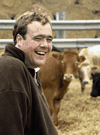Farming for tomorrow

Edward Lindley lives and breathes farming, and is certain that its fortunes will turn around in the not-too-distant future.
Having recently married a local farmer’s daughter and now looking forward to having his own children.
Edward is determined to give them the opportunity to follow in his footsteps.
In 2001, Edward’s parents took out a bigger mortgage and the family moved from a holding in South Yorkshire to the 360ha (900-acre) Hall Farm, in the village of Burton Fleming, East Yorks.
Edward, who shared the farmhouse with his parents and younger sister until his marriage, is given a lot of responsibility.
“I count myself very lucky that my father Robert allows me a lot of freedom when it comes to making decisions about the business,” he says.
“He is semi-retired but still manages the arable side, while I look after the potatoes and the beef cattle.”
The beef herd, one of his newest ventures, is just one indication of his lifelong commitment to the farm.
“The cattle help to maintain soil fertility on the arable land.
Since the advent of the single farm payment, reducing feed costs is vital.
For us, that means using a mainly home-produced ration – we have our own straw, and feed waste potatoes, pea straw and silage from our two-year leys.”
Edward tries to keep an open mind about the land’s potential, and is not afraid to try out new enterprises.
The farm grew 2ha (5 acres) of carrots for the first time this year, and he has been pleased with the result.
Although he has experimented with non-food crops in the past, yields to date have been rather disappointing.
Nevertheless, he remains optimistic about their future prospects.
“I would definitely consider growing crambe and hemp again, but these crops are still in their infancy in this country.
However their performance is improving all the time.
I am looking at borage, although I am slightly worried about volunteers appearing in the potato crop.”
One exciting idea that he hopes will come to fruition is a project which involves teaming up with a relative who owns a forecourt garage nearby.
“We have been talking seriously about processing some of the oilseed rape to make biodiesel to sell to the public,” explains Edward.
“We may also use it on-farm.
Fuel is a major expense, and we spent 25,000 in 2004.
This year, the bill will be nearly 40,000.
“I estimate this project could cut fuel costs by about one-third.
However we need to do a lot of research and planning before the idea is taken any further.”
Another diversification option considered was to turn a farm building into three holiday cottages.
The idea has been put on the back-burner for the moment, because of the high conversion costs and the long wait to get a return on investment.
There were also concerns over spending too much time on a new venture, at the expense of core farm business performance.
Lack of affordable rural housing is a common problem among young farmers, and one that Edward has experienced first-hand, having tried and failed to get unconditional planning permission to build another house on the premises.
Instead he and his new wife Claire took out a mortgage and bought a home in a nearby village.
“After planning permission was rejected several times, we were eventually given the go-ahead, but only if an agricultural tie was placed on the main farmhouse.
That would have seriously lowered its value, so we abandoned the plan.
“About 25 houses have recently been built here, but they are very small and the style does not appeal to us.
We would rather live further away, in a house that we like, with room to accommodate our future family.”
Edward has a passion for agriculture and a clear vision for the future.
“I’m farming for tomorrow,” he stresses.
“I firmly believe that things will come right.
My parents have given me a fantastic start and a great lifestyle.
Hopefully, I will have children of my own.
If they are interested in farming, I would love to offer them the chance to get involved.”
